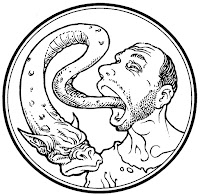"The Passover Is Near"
Grace to you and peace from God our Father, and from our
Lord and Savior Jesus Christ. Amen.
St. John
wrote, “The Passover,
a feast of the Jews, was near.” As we continue our journey to the cross, that statement provides focus
for us. The true focus, today and every day, always ought to be on Our
Lord and what He has in store for us: the great feast and celebration of His
mercy. And the wait will not be long. This feast of Our Lord’s mercy and
compassion and kindness is coming soon. Not too much longer, and then our joy
will be full and free. It’s soon, and very soon.
But it’s not just Easter. St John is pointing us far beyond a
particular Passover and even beyond this year’s Easter. St John is urging us to fix our hearts and
minds on the marriage feast of the Lamb in the kingdom which has no end. To be
sure, it’s present now, here in this place. Even today we are with the Lord in Paradise, but we are not able to experience it yet with
all our senses engaged. The Old Adam within us dulls our vision and stops our
ears to what is true and real right now. It is a wonderful reality that we
stand even now in the Lord’s Kingdom and feast at His table, joining our
departed loved ones and the angelic host. But we barely believe it because we
can’t see it. St John
knew this. And so he wrote, “The Passover is near.” He urges us to keep pushing forward
until that day when the cloud is lifted and we know as fully as we are known, until
we see as clearly as we are seen.
But until that day, as we journey first to the cross, we
fast. We abstain—not just from foods, but also from the things the world
insists are vital. We step back from the things that gratify our passions and
perversions, from the things that we are sure make for the good life, from the
things that lead us down the wrong path. But most of all, we fast and abstain
because we’ve been enticed by Our Lord to follow in His footsteps, in the way
that leads to everlasting life. And Our Lord’s footsteps mark a path that sets
our hearts and minds, our stomachs and desires, not on the things of this
earth, but on the heavenly food that He so earnestly, so lovingly, so freely
provides us.
But then, here comes the devil in concert with the society
surrounding us. They play on our hunger. They urge us to listen with our doubts,
not our ears. And so, at their prodding we ask, “Can God provide food for us
here in the wilderness? Can He give us bread? Can He provide meat for His
people?” That’s what the children of Israel asked in the wilderness. And
that’s what’s behind Philip’s question when he says, “Where shall we buy
bread that these may eat?” Notice the unbelief in this question. Notice the
fear. Remember Luther’s explanation of the First Commandment, and ask yourself:
Do I really fear, love, and trust in God above all things? Do I trust God to
provide my daily bread?
The answer Our Lord gives to our cynical, distrustful,
prideful question is to feed us. And the food is His holy Body, which is the
Bread which came down from heaven so that we might eat of it and live. And the
food is the heavenly manna, laid out on this altar, so that whoever eats of it
in true faith has everlasting life and will be raised up on the Last Day. With
that Bread of Life, we move forward again. We no longer gaze longingly at the
past. We no longer focus merely on the present. We live in the Day of the Lord.
That Day is the marriage feast of the Lamb. And now we live in that Day—not yet
fully, but by faith. And since that Day is both now and near, you no longer
need to live as if death is running your life. You no longer need to live only
for whatever you can get out of life. Life Himself is here, and He gives you
all you need. He gives you the Bread of Heaven, which is the ultimate answer to
all your prayers. In the name of the Father and of the Son (+) and of the Holy
Spirit. Amen.
The peace of God
which passes all understanding will keep your hearts and minds in Christ Jesus
always. Amen.











